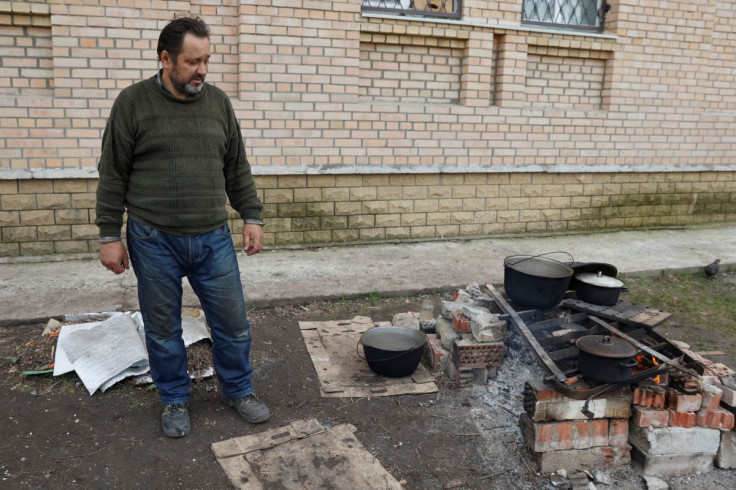Russia Tightens Grip On Ukrainian Factory City, Decries U.S. Rocket Supplies

Russian forces tightened their grip on an industrial Ukrainian city as they battle for control of the eastern Donbas region and targeted rail links used to ferry in weapons from Kyiv's Western allies as the war approaches its 100th day on Friday.
Russia has accused the United States of adding "fuel to the fire" after President Joe Biden announced a $700 million weapons package for Ukraine that will include advanced rocket systems with a range of up to 80 km (50 miles).
Ukraine's President Volodymyr Zelenskiy told a forum in Slovakia on Thursday that Kyiv was grateful for the military aid so far but added: "Weapons supplies should be stepped up ... (to) ensure an inflection point in this confrontation."
The Biden administration said Ukraine had promised it would not use the rocket systems to hit targets inside Russia. Biden hopes extending Ukraine's artillery reach will help push Moscow to negotiate an end to a war in which thousands of people have been killed, cities and towns flattened and more than six million people forced to flee the country.
"Ukraine is fighting an exclusively defensive war, and we always state this," the country's deputy defence minister Hanna Malyar told a briefing, when asked whether Kyiv promised its allies not to use weapons from them to hit targets in Russia.
Moscow has said it regards Ukrainian infrastructure used to bring in Western arms as a legitimate target in what it calls its "special military operation" to disarm Ukraine and rid it of ultra-nationalists the Kremlin says threaten Russian security.
"Pumping (Western) weapons into Ukraine does not change all the parameters of the special operation," Kremlin spokesman Dmitry Peskov told reporters.
"Its goals will be achieved, but this will bring more suffering to Ukraine," Peskov said in response to a question whether U.S. plans to sell Ukraine drones that can be armed with missiles could change the parameters of the conflict.
Four Russian missiles hit railway infrastructure targets in two places in the western Lviv region bordering Poland late on Wednesday, injuring five people and causing significant damage, its governor said on Thursday.
DONBAS CITY IN FOCUS
Zelenskiy told Luxembourg's parliament via videolink on Thursday that Russian forces now occupied a fifth Ukrainian territory and that battle frontlines now stretched more than 1,000 km (620 miles).
Russian forces, backed by heavy artillery, control most of Sievierodonetsk - now largely in ruins - after days of fierce fighting in which they have taken losses, Britain's defence ministry said in its daily intelligence report.
Ukraine's armed forces general staff said, that besides its assault on the city Russian forces were also attacking other parts of the east and northeast, where at least four civilians were killed and 10 wounded, according to other officials.
Russia denies targeting civilians.
The capture of Sievierodonetsk and its smaller twin Lysychansk across the Siverskyi Donets river, would give Russian forces control of all of Luhansk, one of two provinces - with Donetsk - in the Donbas claimed by Moscow on behalf of separatists.
Seizing Luhansk would fulfil one of Russian President Vladimir Putin's stated aims and further shift battlefield momentum in Russia's favour after its forces were pushed back from the capital Kyiv and from northern Ukraine.
Ukraine's General Oleksiy Gromov told a briefing that Russian troops were trying to assault a village on a main road that links Lysychansk with the rest of the country.
Moscow's forces were also attempting to advance south towards the key Ukraine-held cities of Kramatorsk and Sloviansk, in Donetsk province, provincial Pavlo Kyrylenko said.
GLOBAL IMPACT
The war is having a massive impact on the world economy. Russia has captured some of Ukraine's biggest seaports and its navy controls critical Black Sea shipping routes, blocking Ukrainian farm exports and deepening a global food crisis.
Russia and Ukraine together account for nearly a third of global wheat supplies, while Russia is also a key fertilizer exporter and Ukraine a major supplier of corn and sunflower oil.
Ukraine's foreign ministry spokesman, Oleg Nikolenko, said Kyiv was working with international partners to create a U.N.-backed mission to restore Black Sea traffic and let Ukrainian farm produce supplies out.
In further evidence of the economic stress, Ukraine's central bank hoisted the main interest rate to a seven-year-high of 25% from 10% on Thursday to tackle soaring inflation and shield the hryvnia currency.
Bank governor Kyrylo Shevchenko also said it was time to start talks with the International Monetary Fund on a new economic support programme.
Moscow described as "self-destructive" this week's decision by the European Union decision to phase out 90% of Russian oil imports by the end of 2022, saying the move could destabilise global energy markets.
The conflict has also jolted Europe's security arrangements, prompting Finland and Sweden to seek NATO membership, though alliance member Turkey is blocking that move, accusing Stockholm and Helsinki of harbouring people linked to Kurdish militants.
The issue will come up when Biden hosts NATO Secretary-General Jens Stoltenberg at the White House on Thursday. Stoltenberg told reporters he would soon convene a meeting in Brussels with Swedish, Finnish and Turkish officials to discuss the matter.
In a rare moment of joy for Ukraine, its soccer team advanced towards securing a place in this year's World Cup finals with a 3-1 win over Scotland on Wednesday evening.
"This victory is for all Ukrainians, for those who are now at the forefront. We are with them," midfielder Ruslan Malinovsky said after the game.
© Copyright Thomson Reuters 2024. All rights reserved.







